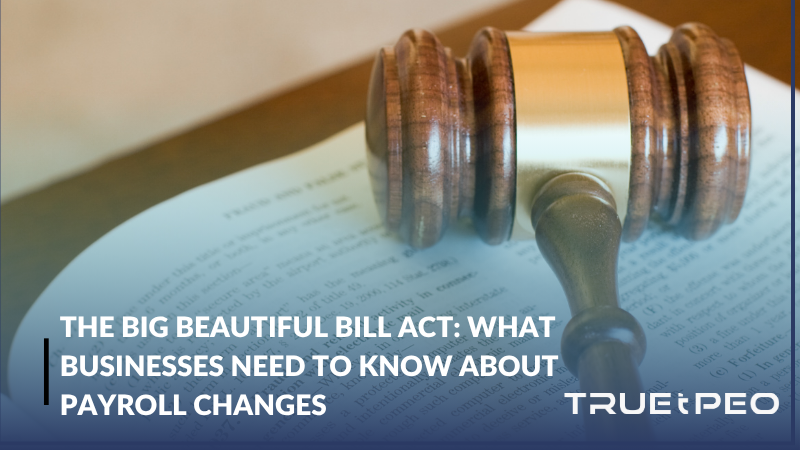
The One Big Beautiful Bill Act (OBBBA) is shaking up payroll and HR rules for employers across the U.S. New deductions for tipped income and overtime pay may help offset costs, but they also come with new compliance pressures. Some provisions are retroactive to January 1, 2025, making it even more important to understand your obligations now. True PEO helps small businesses stay compliant by managing payroll, HR, and risk, so you don’t get caught off guard by evolving regulations. Contact True PEO today to simplify your payroll and compliance processes and protect your business.
The OBBBA, signed into law on July 4, 2025, introduces a wave of payroll, tax, and HR changes meant to support workers and modernize employment law. While the goal is relief for employees and employers, the complexity for small business owners is significant.
From deductions for tipped and hourly workers to changes in standard tax rules, this law touches nearly every business. And because some provisions are retroactive, business owners can’t just “start fresh” going forward, they may need to revisit and adjust records from earlier this year.
One of the most talked-about elements of the OBBBA is the new tipped and overtime deductions. Employers can deduct up to $25,000 for qualified tipped wages and up to $12,500 for overtime premium payments for hourly workers.
On the surface, these changes look like a win for business owners. But there’s a catch: to claim these deductions, every hour worked, every tip reported, and every payroll record must be flawless. Missing paperwork, misclassified employees, or sloppy record‑keeping can mean you lose those deductions, and potentially trigger an audit.
This is exactly where True PEO’s payroll administration service comes in. We ensure every paycheck, tip, and overtime payment is recorded correctly and filed in compliance with IRS and Department of Labor standards, so you can access every deduction you deserve without risking mistakes.
The OBBBA doesn’t just introduce new deductions; it signals increased attention from federal agencies. The IRS and Department of Labor are already tightening oversight on payroll and HR practices. That means small errors could now bring big consequences.
Miss a filing deadline? That could mean fines. Have an outdated policy manual? That might put you at risk during an audit. Classify an employee incorrectly? The penalties could add up fast.
Partnering with a PEO like True PEO provides a built‑in safety net. We handle the paperwork, stay current with every regulatory update, and manage the reporting so you don’t have to live in fear of compliance slip‑ups.
While payroll is at the center of OBBBA, its ripple effects touch every area of business operations, including workers’ compensation and risk management. Any changes in labor rules can impact how claims are processed and how workplace safety is documented.
By including workers’ compensation support and risk management services in our offering, True PEO helps you stay ahead of these changes. We help you navigate claims efficiently, reduce exposure, and keep policies aligned with evolving legal requirements.
The OBBBA also intersects with broader HR processes like benefits administration and onboarding. If your team isn’t trained on the new requirements, or if your employee handbook is out of date, you could be unintentionally creating gaps.
True PEO’s HR compliance team makes sure your policies, documentation, and processes meet both federal and state standards. From updated tax forms to training materials, we cover the details so you don’t get tripped up by the fine print.
The OBBBA is already here, and it’s not optional. The retroactive pieces alone mean many businesses need to act quickly to clean up past records while also preparing for future changes. For small business owners already stretched thin, this can feel impossible.
That’s where True PEO steps in. We take the stress off your plate by handling payroll administration, HR, compliance, and workers’ compensation, so you’re never scrambling to keep up with shifting regulations.
Don’t wait until a missed filing or an audit wakes you up to the stakes. Contact True PEO today to get expert guidance and total peace of mind as the new rules take effect.
The OBBBA is a federal law signed on July 4, 2025, that changes payroll, HR, and tax rules for U.S. businesses. It introduces new deductions and compliance requirements that employers must understand.
Some changes are already in effect retroactive to January 1, 2025, while others will roll out over the next few years. This staggered timeline makes it important for businesses to review records and stay up to date.
Employers can deduct up to $25,000 for tipped wages and up to $12,500 for overtime premiums, if payroll records are accurate and filings are correct. If you need more information, contact True PEO for help managing these changes.